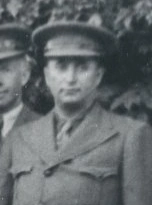More languages
More actions
mNo edit summary Tag: Visual edit |
No edit summary Tag: Visual edit |
||
| Line 1: | Line 1: | ||
{{infobox person|name=János Gálicz|image=János Gálicz.webp|birth_date=1890|death_date=20 October 1939|death_place=[[Moscow]], [[Russian Soviet Federative Socialist Republic (1917–1991)|Russian SFSR]], [[Union of Soviet Socialist Republics (1922–1991)|Soviet Union]]|birth_place=[[Tótkomlós]], [[Békés County]], [[Lands of the Crown of Saint Stephen]], [[Austro-Hungarian Monarchy (1867–1918)|Austria-Hungary)]]|nationality=Hungarian (1914–????)<br>Soviet (1922–1939)|caption=Photo of a Soviet officer, presumably Gálicz|known=His actions during the Spanish Civil War|death_cause=Execution}} | {{infobox person|name=János Gálicz|image=János Gálicz.webp|birth_date=1890|death_date=20 October 1939|death_place=[[Moscow]], [[Russian Soviet Federative Socialist Republic (1917–1991)|Russian SFSR]], [[Union of Soviet Socialist Republics (1922–1991)|Soviet Union]]|birth_place=[[Tótkomlós]], [[Békés County]], [[Lands of the Crown of Saint Stephen]], [[Austro-Hungarian Monarchy (1867–1918)|Austria-Hungary)]]|nationality=Hungarian (1914–????)<br>Soviet (1922–1939)|caption=Photo of a Soviet officer, presumably Gálicz|known=His actions during the Spanish Civil War|death_cause=Execution}} | ||
'''János Gálicz''' or '''General Gal''' was a [[Austro-Hungarian Monarchy (1867–1918)|Hungarian]]-[[Union of Soviet Socialist Republics (1922–1991)|Soviet]] brigade commander who fought in the [[Spanish Civil War|Spanish]] and [[Russian Civil War|Russian Civil Wars]] | '''János Gálicz''', '''José Ivanovich Gal''' (pseudonym), or '''General Gal''' was a [[Austro-Hungarian Monarchy (1867–1918)|Hungarian]]-[[Union of Soviet Socialist Republics (1922–1991)|Soviet]] brigade commander who fought in both the [[Spanish Civil War|Spanish]] and [[Russian Civil War|Russian Civil Wars]] as well as [[First World War|World War I]]. Gálicz gained infamy for his actions in [[Spanish Republic (1931–1939)|Spain]], often throwing outnumbered and inexperienced troops at heavily fortified enemy positions, against the advice of his subordinates. [[Ernest Hemingway]] wrote that the conditions in his sector were "deplorable" and that "he should have been shot." Hemingway's wish was granted, as in 1939, Gálicz was tried by a people's court and sentenced to death in Moscow.<ref>[[Martin Kitchen|Kitchen, Martin]] (2006).: ''Europe Between the Wars.'' Second Edition. [[Longman]]. [[London]]. </ref> | ||
== References == | == References == | ||
Revision as of 09:36, 31 January 2023
János Gálicz | |
|---|---|
 Photo of a Soviet officer, presumably Gálicz | |
| Born | 1890 Tótkomlós, Békés County, Lands of the Crown of Saint Stephen, Austria-Hungary) |
| Died | 20 October 1939 Moscow, Russian SFSR, Soviet Union |
| Cause of death | Execution |
| Nationality | Hungarian (1914–????) Soviet (1922–1939) |
| Known for | His actions during the Spanish Civil War |
János Gálicz, José Ivanovich Gal (pseudonym), or General Gal was a Hungarian-Soviet brigade commander who fought in both the Spanish and Russian Civil Wars as well as World War I. Gálicz gained infamy for his actions in Spain, often throwing outnumbered and inexperienced troops at heavily fortified enemy positions, against the advice of his subordinates. Ernest Hemingway wrote that the conditions in his sector were "deplorable" and that "he should have been shot." Hemingway's wish was granted, as in 1939, Gálicz was tried by a people's court and sentenced to death in Moscow.[1]
References
- ↑ Kitchen, Martin (2006).: Europe Between the Wars. Second Edition. Longman. London.
